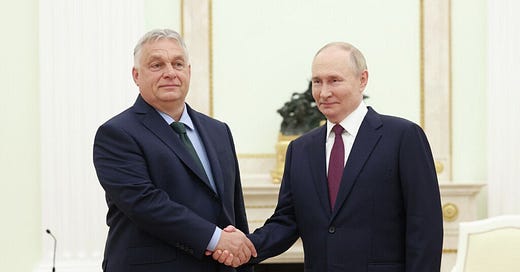Putin and Orban Hold Talks in Moscow, Discuss Ukraine Conflict
As the war continues, the international community watches closely for any signs of potential breakthrough or escalation.
MOSCOW— Russian President Vladimir Putin and Hungarian Prime Minister Viktor Orban met in Moscow on Friday to discuss the ongoing conflict in Ukraine and broader European issues, writes Winston Mwale.
Both leaders made several key statements following their talks, highlighting their positions on the war and potential paths to peace.
Key Statements from Putin:
• Putin claimed that Ukraine opposes a ceasefire to maintain the pretext for extending martial law.
• He suggested that ending martial law would force Ukraine to hold presidential elections, which he believes the current authorities would likely lose.
• The Russian leader rejected the idea of a truce or pause that would allow further arming of Ukraine, instead calling for a "complete and final end to the conflict."
• Putin reiterated Russia's demand for the complete withdrawal of Ukrainian troops from the Donetsk and Lugansk People's Republics, as well as the Zaporozhye and Kherson regions.
• He emphasized the importance of continued dialogue between Moscow and Budapest despite current geopolitical tensions.
Key Statements from Orban:
• Orban acknowledged the significant gap between Russian and Ukrainian positions, stating that "much needs to be done" to bring an end to the conflict.
• The Hungarian Prime Minister said he discussed potential paths to peace in Ukraine with Putin.
• He highlighted the impact of the Ukraine conflict on the European economy and its competitiveness.
• Orban mentioned that he listened to Putin's views on existing peace initiatives, ceasefire proposals, and negotiations, as well as Putin's vision for post-war Europe.
• The Hungarian leader pledged to continue his efforts to resolve the Ukrainian conflict.
This meeting between Putin and Orban comes at a time of heightened tensions between Russia and the West over the ongoing war in Ukraine.
While Hungary, an EU and NATO member, has maintained closer ties with Moscow than many of its European counterparts, Orban's visit to the Russian capital has raised eyebrows in Western diplomatic circles.
The talks underscore the complex diplomatic landscape surrounding the Ukraine conflict, with differing views on paths to peace and the future of European security.
As the war continues, the international community watches closely for any signs of potential breakthrough or escalation.




